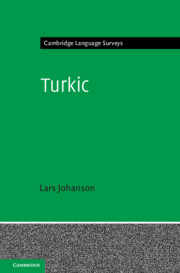Book contents
- Turkic
- Cambridge Language Surveys
- Turkic
- Copyright page
- Contents
- Figures
- Maps
- Tables
- 1 Introduction
- 2 Technicalities
- 3 The Turkic Language Family
- 4 Turcia, the Turkic World
- 5 Status
- 6 Historical Backgrounds
- 7 Cultures
- 8 Linguistic Periodizations
- 9 Registers of Orature and Literature
- 10 Language Contacts
- 11 Lexicon
- 12 Sound Types
- 13 Prime Syllables
- 14 Phonemes in Prime Syllables
- 15 Polysyllabic Word Forms
- 16 Diachronic Phonology
- 17 Diachrony: Vowels
- 18 Diachrony: Consonants
- 19 Writing Systems
- 20 Morphology: Generalities
- 21 Nominals: Nouns
- 22 Nominals: Noun Inflection
- 23 Nominals: Adjectives
- 24 Nominals: Pronominals
- 25 Quantifiers and Numerals
- 26 Postpositions
- 27 Copular Devices
- 28 Verb Stems
- 29 Postverbial Constructions
- 30 Finite Verbals
- 31 Verbals: Viewpoint Aspect
- 32 Old Intraterminals: Aorists
- 33 Focal Intraterminals
- 34 Postterminals
- 35 Terminals
- 36 Imperatives
- 37 Modality
- 38 Voluntatives
- 39 Optatives
- 40 Hypotheticals
- 41 Further Modals
- 42 Copular Particles of Thematic Bases
- 43 Nonfinite Verbals
- 44 Participant Nominals
- 45 Action Nominals
- 46 Converbs
- 47 Adverbs
- 48 Function Words
- 49 Interjections
- 50 Word Accents
- 51 Syntactic Levels
- 52 Nominal Phrases
- 53 Verbal Phrases
- 54 Main Clauses
- 55 Nonmain Clauses
- 56 Sentences
- 57 Above the Sentence Level
- 58 Prosody
- 59 Functional Synopses
- References
- Index of linguistics and historical backgrounds
- Index of languages and dialects
- Index of subjects
8 - Linguistic Periodizations
Published online by Cambridge University Press: 13 August 2021
- Turkic
- Cambridge Language Surveys
- Turkic
- Copyright page
- Contents
- Figures
- Maps
- Tables
- 1 Introduction
- 2 Technicalities
- 3 The Turkic Language Family
- 4 Turcia, the Turkic World
- 5 Status
- 6 Historical Backgrounds
- 7 Cultures
- 8 Linguistic Periodizations
- 9 Registers of Orature and Literature
- 10 Language Contacts
- 11 Lexicon
- 12 Sound Types
- 13 Prime Syllables
- 14 Phonemes in Prime Syllables
- 15 Polysyllabic Word Forms
- 16 Diachronic Phonology
- 17 Diachrony: Vowels
- 18 Diachrony: Consonants
- 19 Writing Systems
- 20 Morphology: Generalities
- 21 Nominals: Nouns
- 22 Nominals: Noun Inflection
- 23 Nominals: Adjectives
- 24 Nominals: Pronominals
- 25 Quantifiers and Numerals
- 26 Postpositions
- 27 Copular Devices
- 28 Verb Stems
- 29 Postverbial Constructions
- 30 Finite Verbals
- 31 Verbals: Viewpoint Aspect
- 32 Old Intraterminals: Aorists
- 33 Focal Intraterminals
- 34 Postterminals
- 35 Terminals
- 36 Imperatives
- 37 Modality
- 38 Voluntatives
- 39 Optatives
- 40 Hypotheticals
- 41 Further Modals
- 42 Copular Particles of Thematic Bases
- 43 Nonfinite Verbals
- 44 Participant Nominals
- 45 Action Nominals
- 46 Converbs
- 47 Adverbs
- 48 Function Words
- 49 Interjections
- 50 Word Accents
- 51 Syntactic Levels
- 52 Nominal Phrases
- 53 Verbal Phrases
- 54 Main Clauses
- 55 Nonmain Clauses
- 56 Sentences
- 57 Above the Sentence Level
- 58 Prosody
- 59 Functional Synopses
- References
- Index of linguistics and historical backgrounds
- Index of languages and dialects
- Index of subjects
Summary
The aim of this brief chapter is to sketch a possible periodization of stages in the diachronic development of Turkic. This is admittedly an almost impossible task since all older stages are insufficiently known and written sources, where available, do not provide reliable information on spoken varieties. One reason for the difficulty to define crucial diachronic limits is the fact that developments in various linguistic domains, i.e. phonology, morphology, lexicon, and syntax, are not congruent, but occur at different speeds. Lack of data makes it hard to specify approximate dates for changes, i.e. the earliest and latest points in time for the emergence or disappearance of a given feature, the terminus post quem ‘the limit after which’) and the terminus ante quem ‘the limit before which’. Nonetheless, linguistic periodization is a favorite hobby of many Turcologists since it allows their imagination to fly around relatively freely.
Information
- Type
- Chapter
- Information
- Turkic , pp. 152 - 156Publisher: Cambridge University PressPrint publication year: 2021
